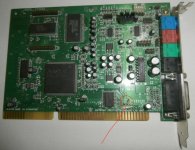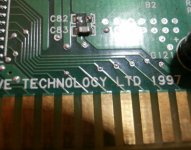I have acquired a Sound Blaster AWE 64 (model CT4520) but after 1st visual examination I have noticed that one SMD capacitor (marked C82) is missing. It's not an optional capacitor, it is broken, there was a minimal piece hanging from its place.
It is placed physically (not electrically) in parallel with another capacitor (C83).
Value of C82 is unknown. Chances are that it had the same value than C83... whose value is also unknown, as it doesn't have any visible code. The only clue is that it seems to be small size (but not the samllest size for a capacitor) and light brown.
Any idea of which capacitor could I use to replace C83?


It is placed physically (not electrically) in parallel with another capacitor (C83).
Value of C82 is unknown. Chances are that it had the same value than C83... whose value is also unknown, as it doesn't have any visible code. The only clue is that it seems to be small size (but not the samllest size for a capacitor) and light brown.
Any idea of which capacitor could I use to replace C83?


